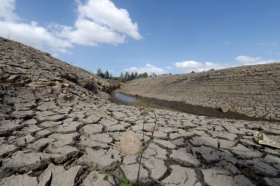Why is global climate change happening?
 Climate change has arrived and is making itself known.
Climate change has arrived and is making itself known.
It’s been an extraordinary six weeks for climate scientists. Any lingering doubts about the immediacy of climate impacts on the lives of Americans are now permanently laid to rest, thanks to four extensive reports from thousands of scientists.
It began with a straight-talking, no-nonsense report called “What We Know” from the world’s largest general science organization (AAAS) earlier this spring that laid out in clear detail why the entire scientific community no longer has any doubts whatsoever about the nature and extent of the climate risk to our economy and communities.
Weeks later, the second and third of successive reports from different arms of the Intergovernmental Panel on Climate Change (IPCC) issued separate, detailed reports on the current science around climate change impacts in the world, and the potential costs to society and the economy right now if we don’t change our energy patterns.
And then this week, a report written by hundreds of American scientists culminated this six-week run of world-class, peer-reviewed science reports with the congressionally-mandated National Climate Assessment that laid climate impacts literally at the doorsteps and window panes of most Americans.
Climate change isn’t a computer model, a fuzzy prediction, a cute picture of polar bears on shrinking icebergs, or some far-off, distant threat that people who aren’t born yet will have to deal with. It’s here, now – and it’s disrupting our lives.
It’s affecting food prices through extended droughts and flooding basements in extreme rainfall events – the types of dry and wet extremes that scientists have been telling us for years would be part of a changing world. Now we can see these things with our own eyes, out our own windows.
It’s causing farmers to plant earlier. Bird lovers are watching habitats shrink and change. Lobstermen are seeing the corrosive effects of both warming waters and ocean acidification change their way of life. Fire chiefs are facing the stark reality of bigger, faster wildfires lasting year round instead of contained to seasons.
What is extraordinary is that nearly everyone can now sense that the artificially contrived science “debate” about whether climate change is real is ending for good – creating space for the more logical, rational discussion about America’s proper role in dealing with a significant, growing and increasingly urgent problem.
It’s about time.
[Droughts, Coastal Flooding Top White House's Global Warming Worries]
Just as Americans finally came to realize that, yes, smoking cigarettes does cause lung cancer – despite years of effort to manufacture doubt about the science of smoking and cancer – the very same sorts of science answers have now emerged clearly for climate change amid a sea of deliberate and manufactured doubt.
Climate change is real – and it’s starting to cause disruptions in all of the various ways that climate scientists have said it would.


|
Anticipatory Policymaking: When Government Acts to Prevent Problems and Why It Is So Difficult (Routledge Research in Public Administration and Public Policy) Book (Routledge) |